A couple of weeks ago I went to Helsinki, Finland to attend OKFestival 2012. It was a suggestion from someone two months ago that planted the seed to go, and I felt it would be really useful. So I saved my pennies and booked the tickets. It was an incredible trip with some incredible learnings.
Check out my “storify” stories which collate my experiences from the two days from my live Tweeting.
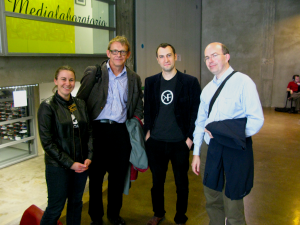 Hanging out with Hans Rosling, Rufus Pollock and Dr Tim Hubbard 🙂
Hanging out with Hans Rosling, Rufus Pollock and Dr Tim Hubbard 🙂
Basically I’ve been working on open government and open data policy and projects for a while now and I realised I had a good opportunity to connect with practitioners and policy makers around the world. I really wanted to pick the brains of these people and also share what is happening locally to share, and to get some context on how we are going in a global context.
 I found many surprising things, not least of all that we are actually comparatively quite well in Australia when you look around the world. Obviously we have a lot to learn and do but we are lucky in many respects, such as we have a relatively open democracy already. For instance, Hansard for Federal and State parliamentary reporting is far from perfect but many countries have abysmal parliamentary openness and transparency. It was quite a shock to realise how little the accountability some jurisdictions operate under. More on that later.
I found many surprising things, not least of all that we are actually comparatively quite well in Australia when you look around the world. Obviously we have a lot to learn and do but we are lucky in many respects, such as we have a relatively open democracy already. For instance, Hansard for Federal and State parliamentary reporting is far from perfect but many countries have abysmal parliamentary openness and transparency. It was quite a shock to realise how little the accountability some jurisdictions operate under. More on that later.
It was also very interesting to hear from over 20 countries on their open data initiatives, to attend technical sessions on publishing data, to hear about the European Commission investment in open data (substantial!), and to talk to people from over 15 countries involved in “apps contests” and other hackfests. There was a lot of interest in our GovHack model so there might be some grounds for collaboration there too.
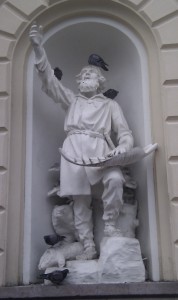 I should also note that upon careful consideration, I thought it might be useful to bootstrap an OKFN Au local chapter in order to pull together all the open knowledge communities across Australia. Some network mechanism is needed as we have growing communities that are completely disconnected from one another. We could all benefit from some cross-disciplinary community development that includes cross promotion, discussions, aggregated events and news, tools for collaboration, support mechanisms (financial, insurance, legal, etc) and perhaps some events that bring us all together for mutual benefit.
I should also note that upon careful consideration, I thought it might be useful to bootstrap an OKFN Au local chapter in order to pull together all the open knowledge communities across Australia. Some network mechanism is needed as we have growing communities that are completely disconnected from one another. We could all benefit from some cross-disciplinary community development that includes cross promotion, discussions, aggregated events and news, tools for collaboration, support mechanisms (financial, insurance, legal, etc) and perhaps some events that bring us all together for mutual benefit.
So, this is my mother-of-all-posts report from the week. I will be blogging on some of the thoughts that have coalesced as a result later, but check out some of my highlights from the week below along with some really useful links. I’m also going to be working with the open government community people at OKFN to do an expanded open data census that looks at specific details of open data initiatives around the world to identify some good practice, policy commonalities and general information for people trying to do open data in government.
Open Government
The Open Government Partnership
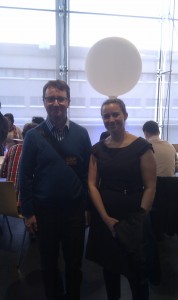
The Open Government Partnership was a key theme for the conference, with over 55 countries now signed up in its first year. Signing up is not only a statement of commitment to this area, but countries have a series of targets on openness and transparency to meet. Apparently OGP has been slower to take off in Asia and Oceania, with only a few countries in this region getting involved to date.
Australia is unfortunately not yet signed up, and I hope that is rectified soon so Australia can more legitimately take our place in this space as something of an emerging leader. I had a lot of people interested in what Australia is doing at the conference from jurisdictions all around the world, and yet whenever we got to OGP discussions, there was not official Australian voice or commitment, which was disappointing. I hope this can be rectified soon, especially as the OGP commitments are already in line with so many existing policies in Australia.
Check out the infographic on the first year of progress of the OGP, and the draft strategic plan which is currently open for public comment.
There were several sessions on the OGP talking about standards, implementation challenges, and many representatives from supporting organisations like the World Bank who are investing in open government initiatives around the world.
Declaration of Parliamentary Openness
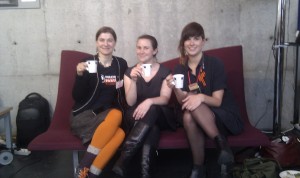
The Declaration of Parliamentary Openness was launched quite recently as an outcome of a global meeting of parliamentary monitoring organisations (PMOs). It is quite an interesting document and again, possibly something Australia should consider signing up to.
NSW Member of Parliament the Hon. Penny Sharpe did a great speech on the Declaration of Parliamentary Openness for International Day of Democracy (September 15th) which happened to be whilst I was in Helsinki. Several people there were very excited about the speech and I was quite honoured to be cited in it 🙂 Nice work Penny!
Check out some of the work from open parliaments around the world.
Open Data around the world

I managed to have a long sit down with the technical lead on data.gov.uk which was fantastic! It was great to get an idea of the model they use for publishing, the development work they have done, what resources they have an more.
My notes on the data.gov.uk discussion, with permission from their technical lead:
- Human resources for data.gov.uk – 3 full time resources only
- Uses CKAN – very happy with it, especially as they can easily develop additional functionality they need
- Every department and local authority has at least one data champion that does data publishing as part of their normal job, ~765 publishers
- Total cost of data.gov.uk only about 460k pound per year. 40k pound hosting and staff = most of the rest
- Primarily focused on publishing data in the best way possible. Not focused on datavis, but considering looking at drupal front end with ckan backend
- Departments are entirely responsibility for publishing their data. The full time staff look after the platform, do development where necessary (have created several plugins specific to their needs and open sourced them), provide technical support to publishers, but onus is on publishers
- data.gov.uk folk have built functionality to handle the structure of government, creating lists of “Publishers” which are individual agencies (etc), users have a list of what Publishers they have access to publish to. You can have hierarchies of Publishers to reflect interrelationships between Publishers
- An account API which could be the corporate API. Only publishers get API keys
- No token required for apps
- Antonio gave us a demonstration of uploading datasets, uploading had an option to choose whether a dataset is part of a time set
- All datasets are appended, content is not changed at all, “if you get into data changing you are dead”
- 5 star rating is helping improve quality of data publishing
- With a multiple data file time series, the API interrogates the entire set
- Contact details are available by dataset
- data.gov.uk do thematic theming, they have over 8000 tags in the system atm, and they created 6 themes: health, environment, education, finance (other things apart from spending), society, defence, transportation, spending data (where they spend money), government
- Automatic updates for some files via JSON but largely manual. Publishers felt more comfortable with manual publishing than aautomation for perceived control
- Tend to point to WMS servers for spatial data rather than host directly
- UK folk suggest a geoserver to host geospatial data and use open data platform to point to data rather than host it directly. A metadata harvester gets data from spatial sets and points to data. Needed to comply with the INSPIRE directive
- They don’t apply 5 star to mapped data (or other purely linked information) as it doesn’t exactly map to downloadable data star rating
- You can search on geospatial datasets by postcode or by drawing an area
- Found that within a minute and 15 seconds (the record) a user could go from not having used the site before to publishing data, very low transition from newbie to publisher which was important
- All statistics are automated which is due to being within the one dept and they are motivated to automated
- INSPIRE (Infrastructure for Spatial Information in the European Community) Directive was a major driver, as was “digital by default”
- They generate monthly reports that counts the openness (stars) of data, the amount per Publisher, publishers with broken links, datasets with broken links. Helps publishers keep their data up to date
- data.gov.uk is building a dashboard to report by the hierarchy of government
- Public Roles and Salaries linked data tool – http://data.gov.uk/organogram/cabinet-office
- Blog post about plugins data.gov.uk have built, all freely available on github – http://data.gov.uk/blog/the-code-behind-datagovuk
- Indemnification from the Crown so public servants not at personal legal risk
- Started with the knowledge management people, then expanded. Basically all parts of the public service were told that this is what they must do, so they did it
- data.gov.uk is hosted by the government, Ubuntu servers
- data.gov.uk – metadata, almost a petabyte of data now
- US is running three open data platforms, including Socrata, CKAN and another bespoke one
- No inferred metadata – up to data publishers to provide metadata
- Real time data – can deal with real time, new functionality being also built
- The value of cloud service to scale with API requirements
For some technical details and the code behind data.gov.uk, check out http://data.gov.uk/blog/the-code-behind-datagovuk
Thanks Toni for your time!
Below are my live tweets on the open data country updates – each person had about 5 minutes to wrap up their country. I’ve put them in alphabetical order and the results were a fascinating snapshot. I wish I’d had more time to talk to each and every contributor:
- Argentina – created Ministry of Modernisation inc Buenos Aires Data, 3 hackathons, datavis, app comp, digital city event coming
- Australia – @piawaugh giving Australia report http://twitpic.com/avwd85
- Australia – What’s going on in#opendata in #australia ? Psi needs to be cc by default. http://instagr.am/p/Ptj4FUodS9/ by Lucy Chambers
- Australia – Not OGP members, national picture mixed, neat local efforts #okfest http://pic.twitter.com/l9u1JK1l by Tariq Khokar
- Belgium – some progress, inconsistent across region. Estonia: need to transform data that is published to use as hard atm.
- Brasil – have also done information asset catalogue to help facilitate future opendata.
- Brasil – new law created to get important datasets published, also have proactive publishing of source code. Cost seen as blocker
- Canada – over 12k datasets this year. Next gen platform deployed next year. Toronto building a city that thinks like the web 🙂
- Canada – lots of municipal level work, national level is participant in OGP with three pillars of opendata openinfo & opendialogue
- Chile – regulation around #opendata created but not implemented yet.
- Czech – working on apps&services based on opendata, OKFN local chapter, data catalogue & opendata.cz, 1st gov data blog. No money
- France – France presentation a reminder that open standards can actually be a blocker to first steps in opening data. #okfest
- France – talk from NosDeputes.fr, lots of cities putting data up, national now commit to open licence, formats an issue/blocker
- Germany case study of getting gov to open up some data, but really just getting stated.
- Ireland – new real time passenger info API coming this year, need national portal, still low priority for many but relatively cheap
- Ireland – 8-9 public bodies in Dublin regional opendata portal. Interested in biz models, datavis, 40% participants entrepreneurs
- Israel – black whole of legislation, printing protocols were hid in boxes. Volunteers went in to scan and digitise. Now gov opened
- Italy – National data portal, people need gov to open data, 3000 datasets liberati 🙂 increase in data quality. Mostly in north
- Kenya – had one year birthday for Kenya opendata portal, focus on open standards, lots happening. No FOI leg yet, community devel
- Netherlands – parliamentary data opened, 1st budget open data tmrw, issues: budget cuts hard, slow grow, gov benefit realisation
- Netherlands – launched open data portal, gov stopped charging for geospatial data, $4m spent to free up satellite images…
- Nigeria – update data hard to get, oil companies & gov corruption high, have digitised & visualised budget -> public engagement
- Open Corporates – has info on 44,470,772 companies in the world. Open database of the corporate world. Interesting. Launched API
- Slovakia – bad news is a lot of new laws but the working group works are slow and projects at risk.
- Slovakia – launched open data portal, has preliminary support, worried about new gov not supporting but did, slow but building up
- South Africa – not so much, Kenya is ahead of us Gov have removed new order mining rights info from website & water quality data
- South Africa – info commissioner an important part to getting more transparency
- South Africa – 1st hackathon in Aug 2012, secrecy bill attempting to shut down access to data, civil society active, OGP work too
- Spain – lot of open data portals (~20), diverse, some good, some not. National portal is good but not much data. Big community tho
- UK – 8661 datasets on new site, good stats, worked with openspending ppl to do reporting & better tools. Increase in public trust
- Uruguay – Fascinating, gov working on data but dropping ball on other opengov #okfest
- US – several initiatives out of date and not detailed enough
- US – lots of stuff proposed, data laws, most of the work is overshadowed by Presidential election, OGP commitments being worked on.
Open Data Census – expand to capture information about individual initiatives?
OKFN have done a great job trying to get a useful comparative analysis of open data in countries around the world. I suggested it might be worthwhile to consider individual initiatives to get some understanding of exactly what is being done around the world, find commonalities and get some ideas around good practice in this space, especially as it is such a new area for so many people.
I put up some draft questions for the next Open Data Census and it’d be great to get feedback.
Outstanding talks I heard
There were many, many, outstanding talks at OKFestival. I’ll just briefly wrap up a few outstanding ones that I really enjoyed 🙂
Dr. Nagy-Rothengass from the European Commission
 Dr Nagy-Rothengass gave a fascinating talk about the European Commission commitment to Open Data. They have committed substantial funding for this, around 100 million Euro and their core rationale for supporting open data are as follows:
Dr Nagy-Rothengass gave a fascinating talk about the European Commission commitment to Open Data. They have committed substantial funding for this, around 100 million Euro and their core rationale for supporting open data are as follows: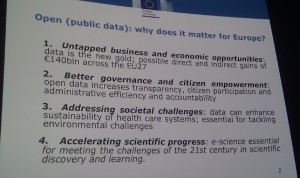
- Untapped business and economic opportunities: data is the new gold; possible direct and indirect gains of 140b Euro across the EU27
- Better Governance and citizen empowerment: open data increases transparency, citizen participation and administrative efficiency and accountability.
- Addressing societal challenges: data can enhance sustainability of health care systems, essential for tackling environmental challenges.
- Accelerating scientific progress: e-science essential for meeting the challenges of the 21st century in scientific discovery and learning.
Hans Rosling
Hans Rosling was a brilliant keynote.
My favourite quotes from the talk:
- If you want to communicate with people you need to learn from tabloids. They are good at connecting with people.
- The problem is not that people don’t know anything about the world, the problem is they have a completely incorrect view. evidence & statistics show world population growing to about 10b after which it normalises.
- The western world has a toxic combination of arrogance and ignorance. Also gender equality doesn’t just happen. It requires work.
- D3 d3js.org as a great tool for #datavis
- We can’t rely on the leaders to deal with the money. We need to get involved and see for ourselves.
- Life has never been so good as today. That the world is bad today doesn’t mean it hasn’t become enormously better.
- We need to seriously invest in renewable energies & isn’t about polar bears. We are up against something much bigger.
- You have to demand access to the data. Countries should report & need to release big data so we can do better.
- OECD *sell* their data! We need to have it liberated so we can understand and learn.
- Don’t talk about what you should do, just mock up and prototype.
He went a little through his normal developing countries vs developed countries spiel which clearly demonstrates the world is a lot closer statistically than many people believe. He spoke about world population growth and showed that it is one of very few things that statisticians have been consistently correct about (with only a 6ish% deviation from projections over 50 years), and yet there is still a lot of fear and misinformation about population growth. He said based on projections and the massive slowdown of population growth, that the world population would peak at around 10 billion and then that number would largely be sustained, unless there was an enormous disaster.
He showed the importance of not dividing the world up into “developing” and “developed” and that people’s understanding of the world is typically quite out of date, based on figures and perspectives taught in school but not updated throughout adult life. This leads to a community making decisions based on outdated information which leads to bad decisions. It was humbling to see actual statistics and realise that we don’t really have embedded societal mechanisms to update what is taught at school, and how this creates a perception of other countries and cultures that may fall completely out of date within just a few years.
Personally I believe strongly that it is through global collaboration that we can leapfrog issues and many of the attendees from what are traditionally call “developing” nations had great stories to tell of citizen empowerment and leapfrogging “developed” countries.
Hans core messages so far as I understood them included the importance of open data to make good decisions, the importance of recognisiing that our understanding of the world is usually out of date, and the importance of the active engagement of civil society in international and national matters to balance out the imbalance of power.
This last point he demonstrated very effectively by showing a picture of world leaders at the Summit on Financial Markets and the World Economy, with some information about which countries were loaning/giving money to others. It was fascinating. Aid money being given from one country to a “developing” country, which was in turn was loaning $30b to the US (when George Bush was in), who was in turn supporting them to get a seat on a UN council. It goes round and round.
Hans made a strong point that people should demand the data and transparency so they can make more informed decisions as a community and not just leave things up to world leaders.
Click through on the following thumbnails to see larger versions.
Rufus Pollock
Rufus is the Director and co-founder of OKFN, and quite an impressive figure. He is passionate about open data and is credited by Sir Tim Berners-Lee as being behind the “Raw Data Now” agenda. Rufus gave a great opening keynote where he spoke about the importance of open data combined with analysis and action. He said we have now started to see more and more data being opened up but if we don’t combine this with good analysis and then action in response to the analysis, then we will not see the benefits of open data.
His speech was largely a spoken version of his blog post called Managing Expectations II: Open Data, Technology and Government 2.0 – What Should We, And Should We Not Expect so I recommend you check it out 🙂
My contributions to OKFestival
Just a couple of notes for people I met there on my contributions.
I hosted a panel on open government, I contributed to several forums and I spoke on the closing panel with Philip Thigo (Program Associate at SODNET & Co-Founder of INFONET, Nairobi, Kenya) & Antti Poikola (OKF Finland Incubating Chapter, Helsinki) which gave me a good opportunity to further discuss the role of the public service in open government. This was received really well and I have a load of public service colleagues now from all around the world in this space.
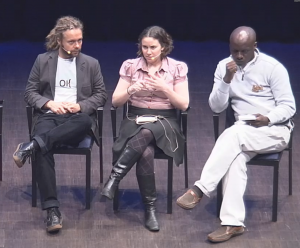
I spoke a little bit about public engagement on public policy and mentioned the Public Sphere methodology that I developed with Senator Kate Lundy. The most recent consultation was one on Digital Culture which was a major contribution to the impending National Cultural Policy. A lot of people asked about analysis, so I spoke a little about the importance for both data analysis and “network” analysis of a consultation to ensure the outcomes have the appropriate context. See the Analysing the community of a public sphere blog post on Senator Lundy’s site.
I also mentioned my Distributed Democracy idea which a few people liked 🙂
Other links of possible interest:
- My blog – which has posts on Gov 2.0, Internet culture, open Internet, open government more broadly and my thoughts on life, the universe and everything going back to 2003 🙂
- The Australian Declaration of Open Government
- The Gov 2.0 Taskforce Report – basis of open gov in Australia
- Ahead of the game – the blueprint for the direction of the public service
- AGIMO (the Federal agency responsible for Gov 2.0) and their blogpost Progress on Government 2.0
- The great work and papers by the Office of the Australian Information Commission and open data as a way to mitigate the rising costs of FoI
- The Statement of Intellectual Property Principles for Australian Government by the Federal Attorney-General, Creative Commons as the default
- Also a more in depth list of examples of Gov 2.0 from Australia was presented by Minister Lundy at the Gov 2.0 Expo in Washington DC a couple of years ago. Obviously there are more recent examples too, but this is a good list

- The Australian Government Innovation blog – has regular news and is quite interesting.
GovHack and App4Country discussion
I was involved in a wonderful discussion with people from over 17 countries who do “apps” competitions and hackfests. It was great to hear about their initiatives and to share the lessons learnt from GovHack. Many of them expressed a lot of interest in our model which is a little broader than the “Apps4Country” model which has been quite popular in Europe. Most of them had the same problems with sustainability, longevity of outcomes from the hackfests, getting the government actively engaged. It was fascinating.
There are some good notes from the global hackfest/apps events collated here and there is a global mailing list (not very active atm) at http://lists.okfn.org/
The notes I made for my presentation about GovHack:
- Narrative, design *and* hacks
- Not focused on apps, but rather hacks (apps, mashups & datavis) – often applications emerge but “apps development” creates confusion with mobile vs web vs devel vs datavis
- GovHack was part of a trilogy of events – GovCamp to set the narrative and vision, GovUX/Jam to apply design thinking to service delivery challenges in the public service, GovHack for open hacking and to make some service delivey design outcomes real
- Open Government, Science & Digital Humanities – to add Data Journalism
– Amazing how much of an impact it made, has really fired the imagination of the public and sector. - Enormous enthusiasm from the gov involved, 7 departments and agencies from federal and state governments were deeply engaged.
- People flew from all over Australia to the two locations that we were simultaneously running the hackfest to participate.
- Mentors from data owners and technologists to support teams along with sessions.
- Made the documentation and presentation of the hack part of the judging criteria, which compelled teams to nicely capture content about their hacks which meant a good archive of the event.
Motivations:
- Bring community together
- Demonstrate value of open data
- Raise the bar for the narrative in Aus, focus efforts on constructive efforts
- Open the data, give depts buy in, connect their tech with community and leaders with success
- Create new ways to do service delivery that can be integrated into gov, fundamentally disrupt gov expectations around “innovation”
- Volunteer run which gave it extra credibility, buy in, and public engagement
- A lot of bad expectations of “apps competitions” because of events that have done it badly, in Aus and internationally
- Open Sourced hacks for people/companies/students/gov to build upon
Lessons learnt:
- Hackers are motivated so long as you create some importance, and engage in conversation to manage tone and deal constructively with trolls
- Prize money is helpful, but need to be careful to ensure good community, tone, “spirit of govhack” award
- Scaling to go national – hackfest for two days, 3 days to vote, awards ceremony, followup 6 months later.
- More funding would be useful
- Ensure non tech elements encouraged, some great non “app” outcomes, eg the jewellery hack
- Engage with the startup and VC sector, open sourcing outcomes means govhack can be yearly incubator for spin offs as well as input to gov. Startups love it as it is the best form of publicity
- Non geeky hacks are the most reportable – History in ACTION
- Technologists have a lot to contribute to policy, and there is a lot of work now to bring these groups together. Data visualisation and other uses of data can massively contribute to policy development and better policy outcomes.
- Ongoing community engagement could be achieved through launching OKFN Au chapter to bring together communities across the gov, data journalists, hacker/geek communities and academia/research.
Interesting thoughts from “apps” conversation:
- Need to strongly socialise – Finland
- Apps for Europe, Spain, lessons from @aabella: 1) Civil society not politicians. Pollies have a role but it needs to be civil society driven. 2) Need to target general population not just tech community, get broader community involved.
Some additional links collected from the week of interest
- Links from Canada:
- OpenPolicy
- GCPedia
- Open Government Data Census
- The Web Index
Some random Open Science links sent:
- http://biologyistechnology.com/
- http://www.synthesis.cc/library/Building_a_21st_Century_Bioeconomy.pdf
- http://www.synthesis.cc/Carlson_Bioeconomic_Proliferation_Final_edited_for_public_release.pdf
Thanks
For the first time I tried couch surfing on this trip and stayed with a lovely Helsinki resident called Tarmo. A huge thanks to Tarmo for having me for the week, it was great to meet and I have to say, the couchsurfing culture is really friendly and lovely 🙂
Also, a huge thanks to Rufus for encouraging me to come, to Daniel Dietrich for his dedication to the open government space, and all the lovely people I met. I look forward to next year 🙂
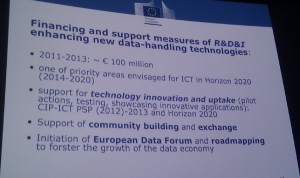

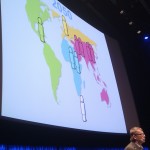
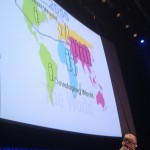



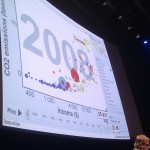

One thought on “OKFestival 2012: Open Data, Open Gov & Open Science in Helsinki”